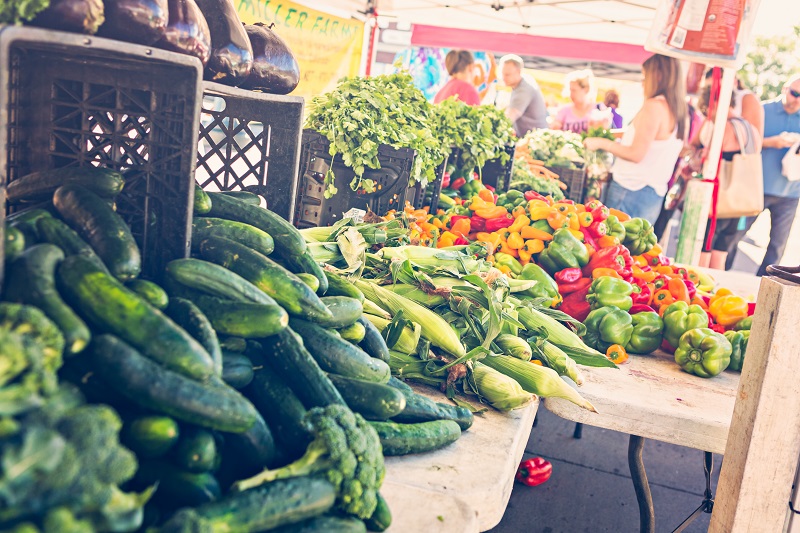
Farmers markets are popular in Missouri and across the nation. In Missouri, over 200 farmers markets are currently in operation. In the United States, there are an estimated 8,600 markets in operation, up from just under 2,000 in 1994.
This guide is a resource for people who are either starting a new farmers market or enhancing an existing market. Its question-and-answer format provides brief answers to common questions and directs readers to free online publications that answer the questions in more detail. (All the web addresses are listed in the resources section.) In addition to addressing questions faced by market organizers across the country, this guide includes information about legal and regulatory issues for farmers markets in Missouri.
Why are farmers markets popular?
Growers, consumers and communities are all recognizing the benefits of farmers markets.
For growers, farmers markets provide an opportunity to sell products at retail prices. This allows growers to gain greater control over production and marketing decisions and also provides growers with opportunities to sell specialty or niche products, products that are limited in quantity, or products of varying quality, such as slightly blemished canning tomatoes. Because the vendor fees charged by markets are much lower than the cost of establishing an off-farm retail outlet, farmers markets enable growers to test new enterprises or give direct marketing a try without making a huge financial investment.
For consumers and communities, farmers markets offer a host of social, economic and health benefits. Farmers markets provide a great place to meet and socialize with neighbors and offer an alternative shopping experience. They draw people out of their homes, help improve neighborhoods, and provide an economic stimulus to neighborhoods and downtown districts. Perhaps most important, farmers markets increase access to fresh food, giving consumers the opportunity to develop relationships with local growers, raising awareness about the food system, and promoting healthy eating habits.
What are qualities of successful farmers markets?
Based on research conducted by Project for Public Spaces, a nonprofit organization dedicated to helping people create and sustain public places and build community, successful public markets share the following 10 qualities:
- Vendors who are focused on quality, service and innovation
- A visible and accessible location with adequate parking
- A diverse mix of vendors, products and events
- A clear understanding of the purpose or mission of the market
- A well-designed, comfortable and welcoming public space
- Collaborations and partnerships with the local community, businesses and organizations
- Sound, transparent financial accounting and a sustainable financial plan
- Creative, appropriate and targeted promotions
- A variety of ways to add value to local economies and communities
- Effective, open-minded and fair management
These qualities are described in detail by David O’Neil in Ten Qualities of Successful Public Markets.
We would like to start a farmers market. How do we begin?
Most farmers markets start as an idea. A group of local growers, a neighborhood association, the local chamber of commerce or, in some cases, a single individual, realizes the benefits of starting a farmers market in their community. From this initial idea, connections are made, meetings are held, and the farmers market begins to materialize.
During the early stages of the market’s creation, when initial conversations and meetings are taking place, try to answer the following questions to help the market get off to a good start. As you begin this process, remember that it does not have to be an intimidating endeavor. This guide answers many commonly asked questions to help alleviate the burden of searching for resources on your own.
Is starting a new farmers market feasible?
Determining the feasibility of a new farmers market is crucial. Try to thoroughly evaluate the interest among local growers, consumers, businesses, government agencies and organizations before proceeding to the next step. Evaluate local retail competition and community demographics. To gain input from a wider audience and uncover unforeseen objections or support, place ads in local newspapers or hold public meetings. If time and funding permit, a formal feasibility study can be conducted. Starting a new market is generally justified if you have firm commitments from six growers and you expect to attract at least 100 customers on each market day.
Who will sponsor the market?
In some cases, growers take a lead role in creating and running a market. In other cases, local governments, nonprofit organizations, chambers of commerce or a new entity formed just for this purpose organizes the new market. Regardless of who starts and operates the market, be sure to involve a wide range of individuals, organizations and businesses to make use of existing talents and resources in the community, resolve disputes and share the workload.
What is the purpose of the market?
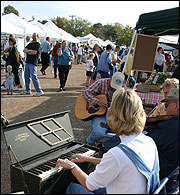
Clearly defining the market’s purpose or mission is perhaps the most important task for market organizers. Typically, farmers markets are created with the primary purpose of serving local growers and consumers. It is also widely recognized that farmers markets help improve and revitalize downtowns and neighborhoods, provide a safe place for people to gather and socialize, and improve access to fresh food, among other benefits. However, a farmers market will not succeed unless growers are able to make a profit, despite the good intentions of market organizers in promoting other goals.
What are some next steps?
There are several ways to organize a new farmers market once you have determined initial interest and support among growers, consumers and the community. The steps to take will vary from market to market. First of all, if you haven’t already done so, form a market organizing committee to provide some structure for your process. Also, consider developing business and marketing plans for your market. Other general considerations include developing the rules and regulations for the market, creating subcommittees within the market organizing committee to handle various tasks, selecting an appropriate location for the market, promoting the market, and helping vendors comply with local, state and federal regulations.
For a detailed description of these and other important considerations, including a sample letter that can be revised and sent to potential vendors, see Starting a Seasonal Open-Air Market in Kansas: A Market Organizer’s Field Guide (PDF), by Claire Homitzky and Jana Beckman.
How do we draft the rules and regulations for our farmers market?
The importance of good rules and regulations cannot be overstated. Farmers market rules and regulations typically outline how the market will operate on a daily basis, define the rights and obligations of both the market and the vendor, and provide answers to the following questions:
- Who can sell at the market?
- What products can be sold?
- What are the location and hours of operation of the market?
- Where will vendors set up at the market?
- What is the cost of selling at the market?
- What will the market experience be like for customers?
- Who will be in charge of the market?
- How will rule infractions and grievances be handled and resolved?
Good rules and regulations will be helpful for keeping vendors happy and minimizing conflicts. For a detailed explanation of farmers market rules and regulations — including a look at statements of market purpose and philosophy, provisions commonly found in farmers market rules, issues that may create challenges when managing a market, questions growers should consider when deciding whether to join a market, and many examples of market rules from around the country — see Farmers’ Market Rules, Regulations and Opportunities (PDF), by Neil D. Hamilton.
For examples of rules and regulations from different farmers markets in Missouri, see the Vendor Handbook for the Columbia Farmers Market and the City Market in Kansas City Rules and Regulations.
Should our market be producer-only or allow products grown by others?
One of the most fundamental issues addressed in any set of rules is whether to allow the sale of products that are produced by someone other than the vendor. Some groups elect to create a producer-only market and allow vendors to sell only products grown on their farms. Others elect to allow for varying quantities of products to be resold at the market. Each option has advantages and disadvantages. For example, producer-only markets capitalize on the increasing interest in local food and are able to cater to customers who place a high value on supporting and getting to know the local growers in their community. Conversely, markets that allow growers and vendors to resell varying amounts of products grown by other growers will often have a wider variety of in-season and out-of-season products and may appeal to customers looking for convenience. In either case, enforcing the rules may require farm visits by the market manager or board of directors to ensure compliance.
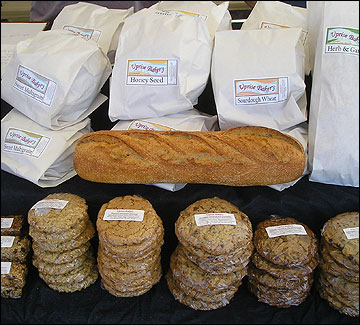
Yet another issue addressed in the market’s rules is whether to allow the sale of nonfood items, such as crafts. If your market intends to allow the sale of crafts, consider creating rules to specify which items may be sold and what percentage of the total number of vendors may sell crafts. Farmers markets sometimes allow vendors to sell crafts to develop a more diverse vendor base and cater to certain customers. Some markets require that craft items be made from materials raised or collected on the vendor’s own farm.
Regardless of which options you choose, it is important to create a market that is not only consistent with the stated purpose of the market but that also meets your customers’ demands. It is also important to weigh your options carefully, survey potential customers about their preferences, and consult with market organizers, managers and growers who have experience with many types of markets.
Do we need a market manager?
Most farmers markets designate or employ a market manager to operate the market. The market manager’s duties are typically described in the market’s rules and regulations and include selecting vendors, allocating booth space, collecting fees, enforcing rules, resolving conflicts, and keeping records, among other things. For an extensive list of market manager duties, see pages 8–9 of Farmers’ Market Rules, Regulations and Opportunities (PDF), by Neil D. Hamilton.
What laws or legal considerations should we be aware of?
The laws and legal considerations that growers and farmers markets are required to comply with may seem overwhelming at first glance. However, it is much wiser to educate yourself now and learn how to comply with these laws rather than to ignore them and get in trouble at a later date. Make it your goal to learn as much as you can about these laws and get to know the public officials responsible for helping you comply with these laws.
For up-to-date information on Missouri law regarding business licensing, taxes and certain tax exemptions for some farmers selling at farmers markets, see the Missouri Department of Agriculture’s Farmers’ Market Handbook available from their Farmers’ Market Resources page. Information on possible legal structures for farmers markets, weights and measures, food safety and insurance are included below.
Legal structure
Farmers markets will need to consider the pros and cons of incorporating under different legal structures or operating under the umbrella of another organization.
Nonprofit
Farmers markets choosing to incorporate as a nonprofit will initially have to draft a set of bylaws and build a board of directors. Additional actions will need to be taken, such as filing a certificate of incorporation, obtaining an employer identification number (EIN), opening a bank account, and filing for federal tax exemption. For an overview, see Candid’s webpage How do I start a nonprofit organization?. MU Extension’s Creating a nonprofit in Missouri webpage has Missouri-specific information. For additional information on incorporating as a nonprofit, contact the Midwest Center for Nonprofit Leadership at 816-235-5720 or toll-free at 800-735-2966. Forms for incorporating as a nonprofit can be found on the Missouri Secretary of State website.
For-profit
Farmers markets that choose to incorporate as a for-profit entity often form a limited liability company (LLC). For information on incorporating as an LLC or other for-profit entity, see the business startup resources at MU Extension’s Business Development program or check out the resources offered by the Small Business Development Center.
Operating as part of another organization
Finally, some markets choose to operate under the umbrella of another organization. Some advantages of this structure are that sponsoring organizations can help provide or secure a location for the market or subsidize the cost of rent, utilities, printing, advertising, insurance and other items. They can also help support the market manager and board of directors when conflicts arise. Operating under the umbrella of another organization will also allow market organizers to forgo the learning and work involved with incorporating as an independent entity. The major disadvantages of this structure are that the sponsoring organizations may place the market’s goals behind their own and limit market organizers’ control over finances and decision making.
Weights and measures
The retail sale of fruits, vegetables and other items at farmers markets in Missouri is regulated by the Weights, Measures and Consumer Protection Division of the Missouri Department of Agriculture. This division is charged with protecting both buyers and sellers whenever goods and services are exchanged. As such, the division sets standards for acceptable units of sale, the use and certification of scales, and the sale of eggs, among other things.
Units and method of sale
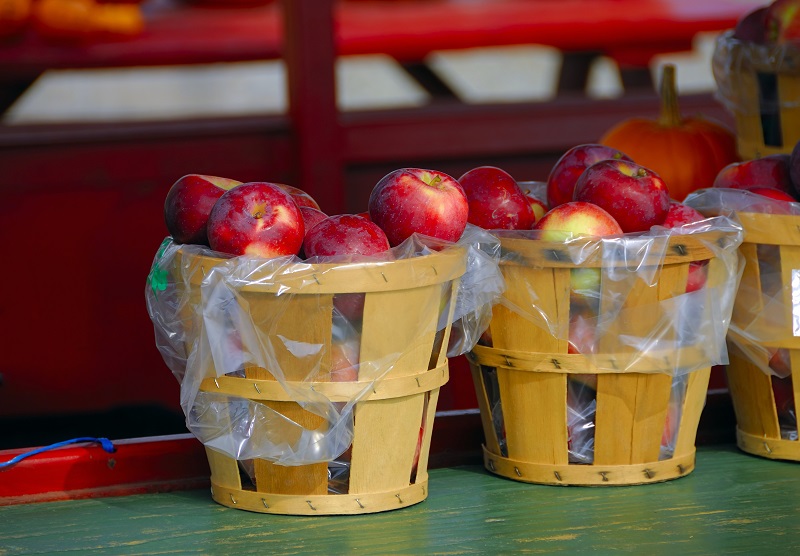
Products at farmers markets may be sold by weight, measure or count, depending on the product. The sale of products by weight or measure is restricted to legally defined standards. For example, when selling by weight, growers are required to use an approved legal-for-trade scale that is inspected annually. For information about scales that are approved, or to get a scale inspected and approved, contact the Device and Commodity Inspection Program.
Eggs
State law requires that growers who produce and sell their own eggs at a farmers market have both a retailer’s license and a dealer’s license. Information about how to obtain these licenses, along with the cost of each license, can be found on the division’s Egg Licensing and Inspection webpage.
Insurance
In some cases, farmers markets may have to carry their own liability insurance to cover accidents that may occur at the market. In other cases, a property owner or sponsoring organization may carry the liability coverage. Farmers markets carrying their own insurance may obtain the insurance through the Missouri Farmers Market Association (MFMA). Check with MFMA for the current rates.
Growers also need to carry their own liability insurance. This can be obtained through one’s insurance agent. A $1,000,000 policy is generally sufficient to cover product liability and accidents away from the farm.
Food safety
We’ve all heard the reports: Unclean meat and produce have made it into the food system to cause illness and sometimes death. Foods of all types have been recalled and pulled from grocery store shelves as a result of improper handling and processing. The last thing we want to hear about next is a foodborne illness or food recall associated with a farmers market. Nobody wants to get sick from eating food that has been improperly handled, and nobody wants to make another person sick. So, market organizers, growers and consumers need to take the issue of food safety seriously.
As noted by GAPs, the National Good Agricultural Practices Network at Cornell University, “food safety begins on the farm.” Food can be contaminated at any stage of food production and distribution by bacteria, viruses, parasites and other substances. However, there are ways to minimize food contamination on the farm. To start with, growers should use manure properly and exclude wild and domestic animals from their growing fields. Clean water should be used for irrigating, cooling and washing vegetables. Anyone who harvests, sorts or packs produce must have clean hands. Finally, work surfaces and storage containers should be washed and sanitized after each use.
Produce growers now need to comply with the Produce Safety Rule, part of the Food Safety Modernization Act passed in 2011. More information can be found on the Missouri Department of Agriculture’s Missouri Produce Safety Program webpage and MU Extension’s Produce safety for growers webpage.
Information from the Missouri Department of Health and Senior Services also notes food contamination risks when handling and selling food at farmers markets. For example, when selling fruits, vegetables or nuts, care should be taken to protect food from environmental contaminants such as rain, dirt, and pests. Overhead canopies and tables are recommended to keep food protected from environmental contaminants. Care should also be taken to protect food from contaminants, such as gasoline, pesticides and herbicides, when growing, harvesting, storing, transporting or selling food. Chemicals and solvents should be stored in sealed, separate containers to protect food from these contaminants.
Selling potentially hazardous foods such as eggs, meat, poultry, fish and dairy products requires additional considerations and controls. Controlling the temperature of these foods is the best way to ensure their quality and safety. Eggs should be held at a temperature no greater than 45 degrees Fahrenheit. Meat should be kept frozen. In addition, meat intended for retail sale should be processed in a USDA- or state-inspected processing plant.
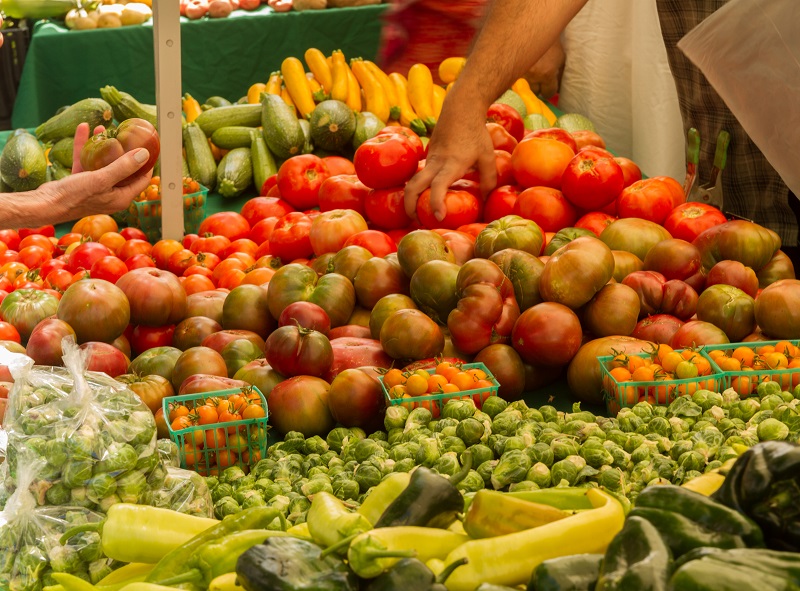
For foods prepared on-site at a farmers market, the general rule is that cold foods need to be kept cold and hot foods need to be kept hot. Most foods held at temperatures between 41 degrees and 135 degrees Fahrenheit foster the growth of harmful bacteria. Handwashing facilities must also be provided, and utensils and equipment must be cleaned and sanitized properly. Use a three-step process to clean utensils and equipment: wash utensils and equipment to remove debris, rinse to remove soap, and sanitize using a diluted chlorine rinse. In addition, prepared foods served at a farmers market are generally required to come from a certified kitchen and that the person preparing the food is certified in some way. Check with your city and county health departments for details.
Processed and canned foods, such as salsa, pickles, relish and sauces, must come from an inspected, approved source. More details can be found in the Missouri Department of Agriculture’s Farmers’ Market Handbook in the Food Processing General Requirements section. However, some exemptions apply for jams, jellies and honey under the Cottage Food Rule for Missouri, found via the MO Department of Health and Senior Services Frequently Asked Questions webpage. These products may be produced in one’s home if they are made in sanitary conditions, are properly labeled, are retailed by the maker of the product, and if they meet other criteria.
In addition, Missouri county and municipal governments may enact health ordinances that are more restrictive than the state’s ordinances. Therefore, you should check with both your county and city public or environmental health agencies to determine which products are approved for sale at farmers markets in your community and how to handle sampling and food demonstrations. Furthermore, you should make every effort to develop a good, friendly working relationship with your local health officials. Taking an adversarial position against any particular department or official is counterproductive. Officials have the power to interpret the laws and work with growers and market organizers to find solutions to challenging situations.
Numerous other resources about food safety at farmers markets are available. The above information was adapted from a Missouri Department of Health and Senior Services presentation titled Food Safety: Sanitation and the Value Added Farmers Market Venues (PDF), and your local public health department may have helpful resources.
What assistance is available for starting a farmers market in Missouri?
MU Extension has faculty and staff who can assist market organizers and producers. To learn about resources available through MU Extension, contact your local extension center.
The Missouri Department of Agriculture also has resources to assist market organizers and producers. For assistance with developing and promoting your market, contact the Agriculture Business Development Division for more information.
The Missouri Department of Agriculture also sponsors the Missouri Grown program to promote farmers markets, agritourism and products grown, raised or processed in Missouri. For membership information, go to the website or call 866-466-8283.
The Missouri Farmers Market Association is an additional resource. The MFMA helps promote Missouri’s farmers markets, provides a forum for the exchange of ideas and resources, promotes economic and community development through local agriculture, and participates in educational programs, legislative advocacy and vendor recruitment. MFMA also provides a source of liability insurance for markets.
What grants and financial assistance are available to farmers markets?
To find the most recent grant opportunities, use an Internet search engine to scan the Web or check with the U.S. Department of Agriculture. Understand, however, that farmers markets cannot be sustained by grants alone. Just like any other business, farmers markets have to generate sufficient revenues to stay in operation. During the initial stages of your market’s development, the market organizing committee should develop business and marketing plans to clearly detail a strategy for sustaining the market without grants. Also, keep David O’Neil’s Ten Qualities of Successful Public Markets in mind as you develop and grow your market.
What attracts customers and keeps them coming back?
Marketing and promoting a farmers market creates unique challenges for market organizers, in part, because customers are looking for a variety of tangible items and intangible qualities at the market. For example, according to The New Farmers’ Market, by Vance Corum, Marcie Rosenzwieg and Eric Gibson, farmers market customers are looking for fresh, high-quality, locally grown products; reasonable prices; an enjoyable and social shopping experience; and "vibrant farmer personalities."
As a market organizer, you are in a unique position because, on the one hand, you have to rely on individual vendors to do a portion of the marketing. Marketing considerations such as product quality, variety and display; customer service and vendor personality; and pricing are generally left to vendors, although stipulations can be made in the market’s rules and regulations to govern certain aspects of these considerations. On the other hand, you are responsible for promoting the market as a complete package and creating a positive, vibrant market atmosphere using special events, the media and community partnerships. Ultimately, balancing both individual and collective marketing efforts requires flexibility, patience and creativity. It may also require working with individual vendors to help them improve their own marketing skills.
Marketing the Market (PDF), a Kansas Rural Center publication, shares several marketing and promotional tips for growers and market organizers. The guide includes information on basic marketing principles, building partnerships with local media and businesses, selling, merchandising, creating a lively market atmosphere, promoting the market, and communicating with customers.
For additional help with marketing farmers markets, contact the Missouri Department of Agriculture’s Agriculture Business Development Division for more information.
Finally, consider developing a marketing plan for your market. Even a basic plan can help you put your marketing ideas into action and keep your market on track.
What resources are available to help growers with marketing and selling?
Many growers are intimidated by the prospect of marketing and selling their products. Despite these fears, growers should try to develop at least a general understanding of marketing and selling – or be willing to recruit family members or employees who can market and sell with confidence. In addition, because farmers market customers expect growers to be a source of knowledge about products, production methods, and food storage and preparation, growers should be willing and able to talk with customers about these and other topics.
Numerous resources are available for growers wishing to develop their marketing, selling and personal communication skills. For information about direct marketing, enterprise evaluation and conducting market research, see Direct Marketing by Katherine Adam, Radhika Balasubrahmanyam and Holly Born.
For information about selling and personal communication, see the MU Extension publication G6222, Selling Strategies for Local Food Producers. This guide offers practical advice on building relationships with customers, discovering customers’ preferences, being an advocate for one’s products, and providing great customer service.
What are the challenges of maintaining a viable farmers market?
A 2006 report published by Oregon State University Extension titled When Things Don’t Work: Some Insights into Why Farmers Markets Close takes a close look at an often-overlooked fact: Despite the recent growth and popularity of farmers markets, many new and small markets don’t succeed. In the report, the authors identify five factors that are often associated with markets that fail:
- Small size
- Lack of farm products
- Little administrative revenue
- Low-paid or volunteer market manager
- High manager turnover
In addition, the report identifies areas of risk and makes recommendations for farmers market organizers.
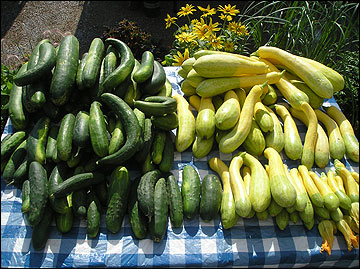
What organizations or associations can our market join?
Associations of farmers markets and other direct marketing ventures exist at the state national, and international levels to assist growers and market organizers. At the state level, the Missouri Farmers Market Association is a valuable resource for market organizers and growers. A national-level organization to consider is the Farmers Market Coalition. At the international level, the North American Farmers’ Direct Marketing Association (NAFDMA) International Agritourism Association works to advance agritourism including on-farm retail, pick your own, consumer-supported agriculture, direct delivery, and farmers’ markets.
How can we evaluate the market’s performance?
Collecting sound information, in a systematic way, can help you identify the strengths and weaknesses of your market. It can also help you make improvements in both the daily operations and long-term planning of the market.
Researchers at Oregon State University have developed a simple, inexpensive set of tools to help market managers and organizers assess a market’s performance. The publication Tools for Rapid Market Assessment, by Larry Lev, Linda Brewer and Garry Stephenson, outlines the procedures for conducting attendance counts, facilitating customer surveys, and using a team of external market reviewers to make observations about some of the market’s attributes.
How do we manage the day-to-day operations of the market?
In large part, the daily operations of your farmers market will be dictated by your rules and regulations. However, the market manager is usually given the authority to interpret and enforce the rules and regulations and handle the day-to-day concerns of the market. The New Farmers’ Market (2nd edition), by Vance Corum, Marcie Rosenzwieg and Eric Gibson, discusses several managerial tasks that may need to be addressed. On the actual day of the market, these are some of those tasks:
- Placing appropriate signs for parking, directions and entrances
- Ensuring that the market is clean, safe and attractive, and that restrooms are clean
- Maintaining an informational booth for market pamphlets and promotional materials
- Assigning stall space to vendors and handling late vendors
- Ensuring product quality
- Resolving conflict and managing customer relations
- Responding to emergencies with first aid or EMT (emergency medical technician) training
- Working with the health department
- Managing volunteers
- Running special events
- Conducting customer surveys
- Collecting market fees from vendors
- Supervising the closing and breakdown of the market
- Packing and storing the informational booth
In between market days, the market manager may also be involved in the following tasks:
- Marketing and promoting the market
- Recruiting vendors and ensuring the quantity and quality of products
- Writing newsletters, market brochures and other communication materials
- Managing the accounting and producing financial reports
- Complying with local, state and federal laws and obtaining appropriate permits and inspections
- Preparing for and attending board meetings
- Recruiting volunteers
Summary
Starting and operating a farmers market can be an exciting, satisfying and worthwhile endeavor. It does not have to be intimidating – especially if you remember to keep things simple, enlist the help of others, and practice good communication. This guide was developed to make the process easier and address some commonly asked questions posed by market organizers. By following this guide and using the resources provided throughout the text in your own community, you will have the tools needed to develop and grow a successful farmers market. Good luck!
Resources
Online resources mentioned
- Agriculture Business Development Division. Missouri Department of Agriculture
- Business startup resources (part of MU Extension’s Business Development program).
- City Market in Kansas City (Missouri) Rules and Regulations.
- Columbia Farmers Market Vendor Handbook
- Cottage Food Rule for Missouri. Missouri Department of Health and Senior Services.
- Creating a Nonprofit in Missouri. MU Extension.
- Device and Commodity Inspection Program. Missouri Department of Agriculture
- Direct Marketing. 1999 (updated 2016). Katherine Adam, Radhika Balasubrahmanyam and Holly Born. ATTRA — National Center for Appropriate Technology, Publication IP113.
- Egg Licensing and Inspection. Missouri Department of Agriculture
- Farmers' Market Handbook. Missouri Department of Agriculture
- Farmers Market Coalition
- Farmers’ Market Rules, Regulations and Opportunities (PDF). Neil D. Hamilton, The National Agricultural Law Center, 2002.
- Food Safety: Sanitation and the Value Added Farmers Market Venues (PDF). Missouri Department of Health and Human Services
- Health Departments/Agencies: Directory of Local Public Health Agencies. Missouri Department of Health and Senior Services
- How do I start a nonprofit organization?. Candid.
- Marketing the Market (PDF). Jerry Jost and Mercedes Taylor-Puckett. Kansas Rural Center Sustainable Agriculture Management Guide MGIOA.1. Kansas Rural Center, Whitting, KS.
- Midwest Center for Nonprofit Leadership
- Missouri Farmers Market Association
- Missouri Grown
- Missouri Produce Safety Program. Missouri Department of Agriculture.
- Missouri Secretary of State
- My Business Is Getting Started. Missouri Business Development Program
- National Good Agricultural Practices Network (GAPs). Cornell University, Department of Food Science
- North American Farmers’ Direct Marketing Association (NAFDMA) International Agritourism Association.
- Produce Safety: Farm to Table (PDF). Missouri Department of Health and Senior Services
- Produce Safety for Growers. MU Extension.
- Project for Public Spaces
- Selling Strategies for Local Food Producers University of Missouri Extension. Publication G6222.
- Small Business Technology and Development Centers in Missouri
- Starting a New Business in Missouri. Missouri Business Development Program
- Starting a Seasonal Open-Air Market in Kansas: A Market Organizer’s Field Guide (PDF).2008. Claire Homitzky and Jana Beckman. Kansas State University Agricultural Experiment Station and Cooperative Extension Service.
- Ten Qualities of Successful Public Markets. David O’Neil. Project for Public Spaces
- Tools for Rapid Market Assessment. 2008. Larry Lev, Linda Brewer, and Garry Stephenson. Oregon State University Extension Service. Oregon Small Farms Technical Report No. 6.
- University of Missouri Extension locations
- Weights, Measures and Consumer Protection Division. Missouri Department of Agriculture
- When Things Don’t Work: Some Insights into Why Farmers Markets Close. 2006. Garry Stephenson, Larry Lev and Linda Brewer. Oregon State University Extension Service. Special Report 1073.
Printed resource mentioned
The New Farmers’ Market: Farm-Fresh Ideas for Producers, Managers, and Communities. 2nd Edition 2015. Vance Corum, Marcie Rosenzweig and Eric Gibson. USDA Sustainable Agriculture Research and Education Program.